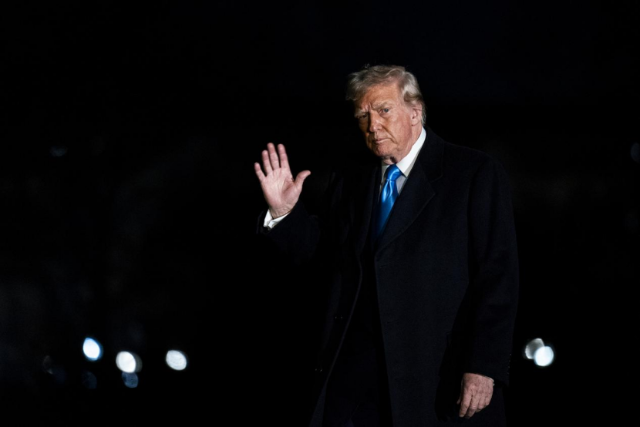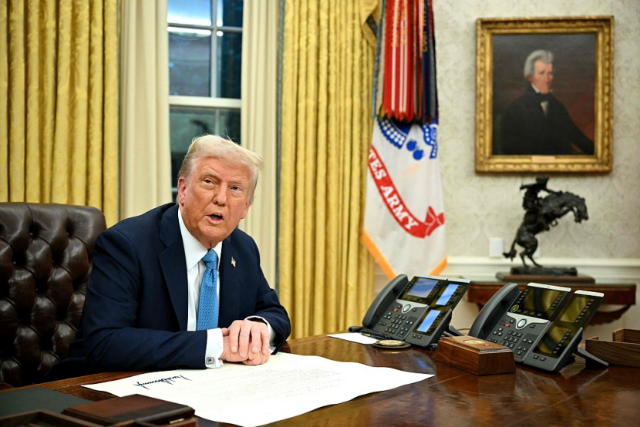
US President Donald Trump walks on the South Lawn of the White House after arriving on Marine One in Washington, DC, USA, on February 2, 2025. (CFP Photo)
"History never repeats itself, but it does often rhyme." The quote from American novelist Mark Twain rings through the moves of 47th US President Donald Trump in his second term after stepping down in 2021. Brandishing tariffs stick to traditional US partner economies and "cooperative rivalry," the man who touts "Make America Great Again" is tearing the globe apart again.
The first two weeks of Trump's second term were marked by a flurry of tariff executive orders. He announced the imposition of 25% tariffs on most goods from Canada and Mexico despite agreeing to a 30-day pause, along with a 10% increase in tariffs on goods from China since February 4. Additionally, he hinted that the European Union (EU) could be the next to face duties "pretty soon."
Trump seems to regard tariffs as the panacea to resolve the US trade deficit in goods, which widened to some $1.2 trillion in 2024, a record high since 2022, based on data from the US Commerce Department on February 5.
However, the panacea in Trump's eyes turned out to be snake oil. According to the US Bureau of Economic Analysis and the US Census Bureau, the US goods and services deficit during Trump's first term proliferated from US$552.3 billion in 2017 to US$678.7 billion in 2020, with a plunge in 2019 heavily attributed to the Covid-19 pandemic.

US President Donald Trump speaks to the press after signing an executive order in the Oval Office of the White House in Washington, DC, on January 31, 2025. (CFP Photo)
Ironically, China, the country most battered by imposed tariffs in Trump's first term, returned as the top US trade partner in 2020, followed by Mexico and Canada. The two largest destinations for US total exports continued to be the trading partners under the US–Mexico–Canada Agreement.
Upon the newly imposed tariffs in Trump's second term, US research institutions and economists have made it clear that domestic consumers in the US will pay the price.
According to projections from the Peterson Institute for International Economics (PIIE), the direct cost of tariffs on Mexico, Canada, and China to the median US household would result in a tax increase of more than $1,200 a year.
Dani Rodrik, a professor of International Political Economy at Harvard's John F. Kennedy School of Government, has warned in an Op-Edthat when tariffs are indiscriminate and not supported by purposeful policies at home, they do considerable damage—and more so at home than to trade partners.
Additionally, an analysis by the Brookings Institution on February 3 revealed that Trump’s 25% tariffs on Canada and Mexico will be a blow to all three economies.
Detailing the medium-term fallout on economic growth, jobs, exports, and inflation of the US imposing 25% tariffs on imports from Mexico and Canada, with and without retaliation, the author noted that these levies will hurt all three countries. He underlined that unless the Trump administration unwinds the tariffs quickly, the economic, diplomatic, and strategic harms will be substantial.
Against the backdrop of duties, China has announced it will implement a 15% tariff on coal and liquefied natural gas (LNG) products, as well as a 10% tariff on crude oil, agricultural machinery, and large-engine cars imported from the US. The tariffs would come into force on February 10, leaving room for further negotiation between the two sides. The move can be seen as a calculated and measured response.

German Chancellor Olaf Scholz speaks to the press outside the Justus Lipsius building, during an informal European Union (EU) leaders' retreat in Brussels on February 3, 2025. (CFP Photo)
As for European countries, the US's traditional trade partners, Trump grumbled about Europeans' slim interest in vehicles, farm products, and everything from the US. He warned that the 27-nation bloc would "definitely" face US tariffs.
The European Union seeks to engage swiftly with the United States over Trump's planned tariffs, as trade chief Maros Sefcovic noted on February 4. While EU Commission President Ursula von der Leyen confessed that negotiating would be a tough job.
Perhaps former US Secretary of State Henry Kissinger again justifies his mastery of US geopolitics: "It may be dangerous to be America's enemy, but to be America's friend is fatal," as the quote echoes Trump's deeds. For all the capriciousness of the president, he would lead the US into a rather isolated stance worldwide, indeed.
Author | Zhang Ruijun
Editor | Yuan Zixiang, James, Shen He
















